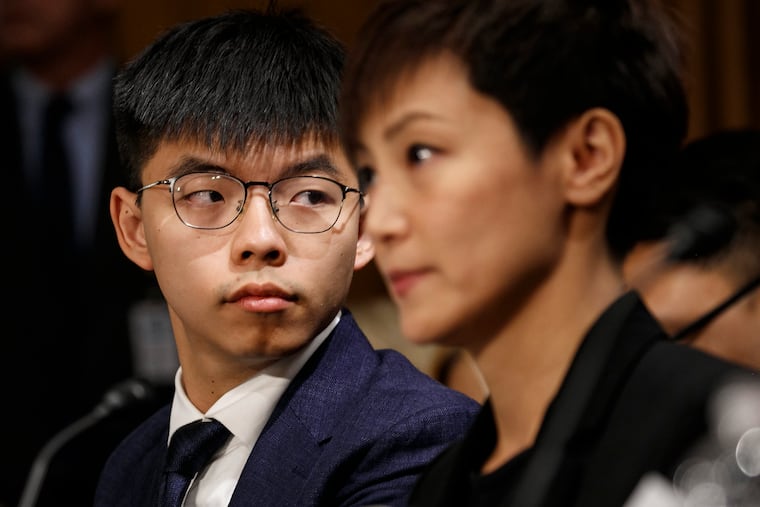Hong Kong democracy activists deserve U.S. support | Trudy Rubin
Beijing's repression of Hong Kong democracy is an affront to human rights, U.S. law, global security — and China's own economic interests.

For nearly four months, millions of Hong Kong citizens from all walks of life have taken to the streets to protest Beijing’s efforts to curb their freedoms.
Last week some of the youthful heroes of Hong Kong’s democracy movement came to Washington to urge Congress to support their struggle. They deserve that support, and not only because they are fighting bravely for free elections and rule of law.
The Hong Kong drama has taken on a global significance that goes far beyond an internal Chinese struggle. How Beijing chooses to resolve this struggle could powerfully impact its relationship with the West.
Hong Kong’s civic freedoms were supposedly enshrined in the 1984 Sino-British declaration, an international treaty that was the basis for Britain’s return of the territory to Chinese sovereignty in 1997. The pact guaranteed Hong Kong a “high degree of autonomy” for 50 years. It laid out a “One Country, Two Systems” framework that preserved the territory’s independent judiciary and pledged to expand free elections.
Beijing has been steadily eroding those freedoms. The current protests were sparked when the city’s Beijing-backed chief executive, Carrie Lam, introduced a controversial extradition bill, which would have permitted Hong Kongers to be sent for trial in mainland China’s courts. Those courts are controlled by the Communist Party.
“Today, we are approaching dangerously close to “One Country, One System,” the 22-year-old, bespectacled Joshua Wong testified last week before the Congressional-Executive Commission on China. As a teenager, Wong led the 2014 Umbrella Movement that protested Beijing’s escalating curbs on election freedoms. When I interviewed him in 2016, he conceded that the odds of preserving Hong Kong democracy resembled David’s against Goliath. Yet, he insisted, “We are trying to create a miracle.”
» READ MORE: Hong Kong democracy protests should inspire Americans | Trudy Rubin
Today’s protest movement is leaderless, and mostly peaceful, with some very violent, relatively small exceptions. But the Hong Kong police reaction, encouraged by Beijing, has been brutal, with at least 1,400 arrests.
“No one can be certain what will happen after Oct. 1,” Wong said last week, referring to upcoming 70th anniversary celebrations of the establishment of the People’s Republic of China.
Clearly Beijing is wary of a military crackdown that might resemble the 1989 massacre in Tiananmen Square, and Lam recently withdrew the extradition bill. However, demonstrators insist they won’t stop before election freedoms are expanded, police violence investigated, and jailed protesters released. Wong cautioned: “Sending in the tanks remains irrational but not impossible.”
Here is where the Hong Kong issue becomes far larger than the fate of its 7.5 million people. If Beijing cannot tolerate the “one country, two systems” model within its territory, a model to which it is committed by treaty, what does that portend for its future behavior toward neighboring democracies in Asia? What would it mean for the future of democratic Taiwan, a U.S. ally, which Beijing considers to be a renegade province?
“If Hong Kong falls, it would easily become the springboard for … China to push its rules and priorities overseas,” argued singer and democracy activist Denise Ho at the hearing. She has been blacklisted as a performer in China for her political stance.
And there is another important reason for Congress to focus on developments in Hong Kong. U.S. law gives special economic benefits to Hong Kong — treating it as a separate customs territory from mainland China, so long as Hong Kong remains “sufficiently autonomous.”
So Congress should swiftly pass the Hong Kong Human Rights and Democracy Act, which would require the secretary of state to certify annually that the territory meets that standard. As Wong put it, “Beijing shouldn’t have it both ways, reaping all the economic benefits of Hong Kong’s standing in the world while eradicating our freedoms.”
» From the archives: Hong Kong’s struggle for democracy (2016)
And if President Trump were paying attention — rather than sloughing off Hong Kong protests as “a very tough situation” — he would be quietly messaging Xi Jinping that it was in Beijing’s interest for the crisis to be resolved peacefully.
After all, well over half of all nonportfolio investment coming to and from China to the rest of the world passes through Hong Kong in one form or another, according to former U.S. consul general in Hong Kong, Kurt Tong. “Why would that be? It’s because of the legal structure and the reliability of the Hong Kong courts and Hong Kong law,” he said recently. That’s why there’s 1,400 U.S. companies operating there.
If Beijing crushes the protests -- along with the territory’s autonomy -- investor confidence in Hong Kong’s economy will plunge. That is a message U.S. officials should be clearly communicating to their Chinese counterparts.
“Historians will celebrate the United States Congress for having stood on the side of Hong Kongers,” Joshua Wong promised.
If Congress and Trump do the right thing — and soon.